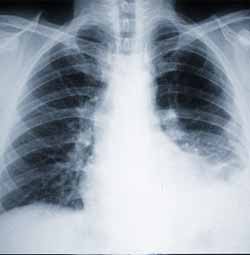Mesothelioma
Treatment
Mesothelioma treatment for this asbestos-related
cancer is best served when started after an early diagnosis. Unfortunately,
most cases of mesothelioma are not caught until the later stages
of the illness when prognosis is grim for recovery and patients
have but a few weeks to 12 months to live, in general.
 X-ray
of patient with mesothelioma
X-ray
of patient with mesothelioma |
|
Asbestos
dangers are well documented as is the connection between asbestos
and mesothelioma.
Mesothelioma is a cancer of the mesothelium, which is a 2-layer
protective lining that covers the lungs, heart and some internal
organs. Between 2,000 and 3,000 cases of mesothelioma are diagnosed
each year and almost all stem from past exposure to asbestos.
In fact, the exposure to asbestos may have happened up to 50 years
before the diagnosis is made.
Mesothelioma
Treatment
Mesothelioma treatment usually involves surgery, chemotherapy
and / or radiation therapy. In some other instances therapies
such as immunotherapy, photodynamic therapy and experimental therapies
that are part of clinical trials may be used. While not intended
as a cure, palliative surgical procedures may also be used to
treat the symptoms associated with mesothelioma.
Mesothelioma treatment will depend upon, which area of the body
is affected by the cancer. Typically, the areas that are affected
are the linings of the plura (lungs), pericardium (heart) or the
peritoneum (abdominal cavity).
Mesothelioma treatment for the plura (the most prevalent form
of mesothelioma) begins once the cancer is discovered, which is
typically during a routine exam. Sometimes the patient will complain
of pain breathing since the tumor has made its way in-between
the lungs and rib cage. This type of mesothelioma is only caused
by asbestos fibers. An X-ray, CT scan or MRI usually uncovers
the potential cancer, which is then followed by a bronchoscopy
so that the surgeon may take a look at the tumor inside the lungs.
The only sure way to diagnose mesothelioma is through a biopsy.
Once the biopsy has been confirmed to be plural mesothelioma,
then surgery may be scheduled. Oftentimes surgery is the first
method used to combat the cancer and is followed by either chemotherapy
or radiation therapy in order to decrease and shrink the cancerous
cells missed by the surgery.
Treatment for Peritoneal Mesothelioma (the second most-prevalent
form) begins once diagnosis is made, which is no small feat since
the symptoms are non-specific and are often misdiagnosed. Symptoms
such as abdominal pain and swelling, weight loss, loss of appetite,
breathing difficulties, nausea and bowel obstruction are often
attributed to less serious disease processes. Once Peritoneal
Mesothelioma has been confirmed with a biopsy, then treatment
will likely involve surgery, chemotherapy and / or radiation therapy,
much like for Plural Mesothelioma. However, for some patients,
surgery is not an option and may undergo either chemotherapy or
radiation therapy depending upon the advanced stage of the cancer,
the patient's health and other factors.
Treatment for pericardial mesothelioma (the rarest form of mesothelioma)
may involve options similar to those for both Plural Mesothelioma
and Peritoneal Mesothelioma. pericardial mesothelioma, which is
cancer of the lining of the heart is reported to be the most painful
form of the disease. Symptons of pericardial mesothelioma include
chest pains, persistent coughing, shortness of breath and heart
palpitations. Usually those who contract this form of mesothelioma
are those who worked with asbestos-laden products or in asbestos-heavy
buildings most of their working years. Those with pericardial
mesothelioma have perhaps the worst prognosis of all with this
type of cancer, with an expected lifespan of not more than 12
months.
Mesothelioma treatment for the three different types of cancer
may also involve another type of method called palliative surgical
procedures. With this type of procedure, the symptoms of mesothelioma
are treated without treating the disease itself. This type of
treatment can extend the life expectancy of those diagnosed with
mesothelioma.
Gaining popularity is a fourth type of standard mesothelioma
treatment called Immunotherapy. With Immunotherapy a person's
own immune system may be stimulated to fight the cancer or an
outside source may be introduced that will serve the same purpose.
Some physicians believe that in many cases of mesothelioma, the
body has a difficult time recognizing the cancerous cells as foreign
invaders that need to be killed off. With Immunotherapy the body's
immune system is put on high alert and antibodies are stimulated
to attack the cancerous cells. This type of therapy is usually
used in conjunction with the other three treatments to help extend
a persons life by months and sometimes years.
Another type of mesothelioma treatment is called Photodynamic
therapy, which uses a photosensitizing drug that is absorbed by
the cancer cells. A light source is applied to the cancer cells
and the drug reacts to the light, creating a reaction and giving
off a chemical that kills the mesothelioma cells. Clinical trials
are currently being conducted to assess the effectiveness of Photodynamic
therapy as a viable treatment and early results are encouraging.
Research is ongoing and new tests are being developed in this
area.
Other clinical trials are also ongoing and patients who meet
the criteria are encouraged to apply for the trials. New tests
and treatments are constantly being researched and developed.
As with all cases of mesothelioma, time is of the essence. If
you or a loved one has this disease then seek immediate medical
help and seek immediate legal help from an asbestos
lawyer as well. It's important to contact a personal injury
lawyer who specializes in mesothelioma
lawsuits as many times insurance will not cover the overwhelming
medical costs. In order for the surviving family to not have to
face potential bankruptcy or other financial hardship, seeking
out an asbestos lawyer now may save much anguish later.
|


